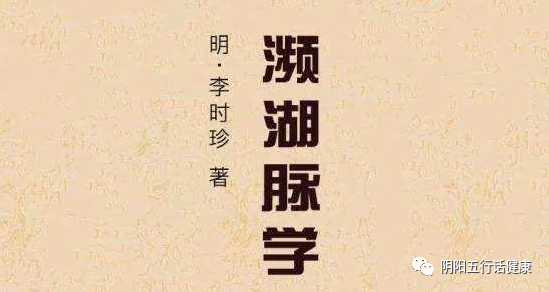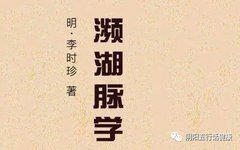Floating (Yang)
【Body Condition Poem】 The floating pulse rises only from the flesh, like following the lightness of the elm pods; in autumn, if it is present, it indicates no illness, but if encountered in a long-term illness, it can be alarming.
【Similar Condition Poem】 Floating is like wood floating in water, floating large and hollow is the Kōu pulse; if it floats lightly, it is the Hóng pulse, though it may be vigorous upon arrival, it departs leisurely. The floating pulse is light and flat like twisting scallions, if it comes weakly and late, it is large and empty; floating and soft is the Rú pulse, scattered like willow catkins with no fixed trace.
【Main Disease Poem】 The floating pulse indicates a Yang exterior disease, with slow wind, multiple heat, and tight cold; if floating and strong, it suggests much wind-heat, while if weak and floating, it indicates blood deficiency. A floating pulse at the inch indicates headache and dizziness from wind, or there may be phlegm and wind gathering in the chest; at the guān, the earth is weak and wood is strong, while at the chǐ, urination is obstructed.
Deep (Yin)
【Body Condition Poem】 The water flows down, the pulse comes deep, soft and smooth between the muscles and bones; for women, it is at the inch, for men, at the chǐ, this is the norm throughout the four seasons.
【Similar Condition Poem】 The deep pulse helps adjust the muscles and bones, if pressed, it pushes the muscles to the bones; deep and fine like cotton is a true weak pulse, while a long and firm pulse is a solid shape.
【Main Disease Poem】 The deep pulse indicates water accumulation in the Yin channels, with multiple heat, slow cold, and phlegm; if weak and deep, it suggests deficiency of Qi, while if deep and strong, it indicates accumulation and cold. A deep pulse at the inch indicates phlegm stagnation and water retention in the chest, while at the guān, it indicates internal cold pain and obstruction; at the chǐ, it indicates turbid leakage and diarrhea, with kidney deficiency affecting the lower back.
Slow (Yin)
【Body Condition Poem】 A slow pulse comes with only three beats per breath, Yang cannot overcome Yin, and the Qi and blood are cold; just separate floating and deep to distinguish exterior and interior, to dispel Yin, one needs to tonify the source of fire.
【Similar Condition Poem】 A pulse with three beats is called slow, a small horse at slow makes it hold; slow and fine yet difficult to discern is the Sè pulse, while floating and slow indicates deficiency.
【Main Disease Poem】 The slow pulse governs organ diseases or much phlegm, deep chronic conditions must be examined closely; if strong and slow, it indicates cold pain, while slow and weak indicates deficiency and cold. A slow pulse at the inch must indicate upper Jiao cold; at the guān, it indicates internal cold pain; at the chǐ, it indicates kidney deficiency with heaviness in the lower back, and urination is not free, with hernia pulling at the testicles.
Rapid (Yang)
【Body Condition Poem】 The rapid pulse beats six times per breath, with weak Yin and strong Yang, it must be agitated; floating and deep separate exterior and interior, only children show auspicious signs.
【Similar Condition Poem】 Rapid is more than a normal person by one beat, tight like a string, it comes and goes; rapid and then stops is called Chù, rapid seen at the guān indicates arterial shape.
【Main Disease Poem】 The rapid pulse indicates Yang heat, it can be treated with the fire of the monarch; it is suitable to cool and drain, while deficiency needs warming and tonifying; lung diseases in autumn are to be feared. A rapid pulse at the inch indicates sore throat and tongue sores, with red vomiting and coughing indicating lung ulcers; at the guān, it indicates stomach fire and liver fire, while at the chǐ, it indicates nourishing Yin and lowering fire decoction.
Slippery (Yang with Yin)
【Body Condition Poem】 The slippery pulse is like beads, flowing smoothly yet returning; do not mistake slippery and rapid as the same, rapid pulse is only seen at intervals.
【Main Disease Poem】 The slippery pulse indicates Yang Qi is declining, phlegm causes numerous diseases and food causes disasters; above it causes vomiting and reversal, below it accumulates blood, for women, the pulse regulates during pregnancy. A slippery pulse at the inch indicates phlegm causing vomiting, sour swallowing, or coughing; at the guān, it indicates retained food, liver and spleen heat, thirst, and urination issues at the chǐ.
Wiry (Yang with Yin)
【Body Condition Poem】 The wiry pulse is long and straight, the liver channel is strong and wood injures earth; anger fills the chest and often wants to shout, obscuring the eyes and causing tears to flow.
【Similar Condition Poem】 The wiry pulse comes straight like a string, tight like a rope, it bounces left and right; tight indicates strength, wiry indicates shape, solid pulse is wiry and long in the depths.
【Main Disease Poem】 The wiry pulse corresponds to the liver and gallbladder channels, with phlegm and cold heat afflicting the body; floating, deep, slow, and rapid must be distinguished, with large and small having weight and light. A wiry pulse at the inch indicates headache and phlegm accumulation, while at the guān, it indicates cold and heat symptoms; at the chǐ, it indicates Yin hernia and leg cramps.
Weak (Yin)
【Body Condition Poem】 The weak pulse comes without strength, pressing it feels soft, soft and fine yet deep, Yang sinks into Yin, Qi and blood are weak.
【Main Disease Poem】 The weak pulse indicates Yin deficiency and Yang Qi decline, with aversion to cold, fever, and weakness in bones and muscles; much fright and sweating reduce spirit, tonifying Qi and nourishing blood must be done early. A weak pulse at the inch indicates Yang deficiency, while at the guān, it indicates weak stomach and spleen; to seek Yang sinking into Yin deficiency, one must push the two parts of the Shenmen.
Scattered (Yang)
【Body Condition Poem】 The scattered pulse is like flowers blown away, coming and going without order; during childbirth, it indicates a sign of birth, while in long-term illness, it is not necessary to treat.
【Main Disease Poem】 The left inch indicates palpitations, the right inch indicates sweating, the left guān indicates soft and scattered; the right guān indicates soft and scattered, with swelling in the legs indicating the soul is broken.
Fine (Yin)
【Body Condition Poem】 The fine pulse is thin like silk, pressing it feels heavy and endless; spring and summer are not favorable for the young, while autumn and winter are suitable for the old and weak.
【Main Disease Poem】 The fine pulse indicates blood and Qi are weak, with various deficiencies and emotional disturbances; if not due to dampness invading the kidney, it is due to blood loss and sweating. A fine pulse at the inch indicates frequent vomiting, at the guān indicates abdominal distension and weak stomach; at the chǐ indicates cold in the lower abdomen, with diarrhea, blood in urine, or loss of essence.
Hidden (Yin)
【Body Condition Poem】 The hidden pulse pushes the muscles to the bones, moving between the fingers, hidden and deep; if there is a cold injury, it wants to sweat to resolve, while the reverse indicates abdominal pain belonging to Yin.
【Main Disease Poem】 The hidden pulse indicates frequent vomiting due to cholera, abdominal pain often due to retained food; retained fluid and old phlegm cause accumulation, while scattered cold and warmth should not be delayed. Food stagnation in the chest indicates double inches hidden, wanting to vomit but cannot; when abdominal pain is heavy and deep, the guān indicates hernia pain and abdominal rupture.
Moving (Yang)
【Body Condition Poem】 The moving pulse shakes and sways, often at the guān, with no head or tail, like a bean-shaped lump; its origin is the clash of Yin and Yang, the weak shakes while the strong is stable.
【Main Disease Poem】 The moving pulse governs pain and fright, sweating due to Yang movement and heat due to Yin; it may indicate diarrhea, cramping diseases, loss of essence in men, and bleeding in women.
Conclusion: The pulse diagnosis is a crucial aspect of Traditional Chinese Medicine, providing insights into the body’s condition and guiding treatment strategies.


